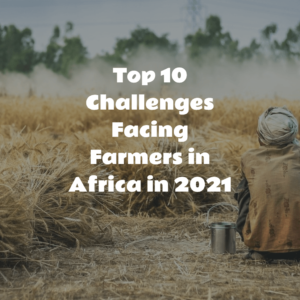Farmers in Africa continue to face various challenges that affect the productivity of their farms and put huge dents in their pockets. Below are the top 10 challenges facing farmers in Africa in 2021.
10. Farm Size
- The increasing population in Africa has continued to put pressure on existing arable land. As families grow in size, they are forced to subdivide their portions of land and put up living quarters on land that could be used for farming. Also, in countries that have large portions of arid land, families are forced to settle on the smaller portions of arable land where they practice subsistence farming, rather than commercial agriculture.
9. Consumer Tastes
- Meeting the changing consumer tastes is one of the top 10 challenges facing farmers in Africa in 2021. Consumers are demanding high-quality, organic food with increased nutritional content, as well as food that is grown without leaving chemical residues in the soil. Farmers are therefore faced with the tough decision of either moving to organic farming which is more expensive or maintaining the status quo and sourcing new markets.
8. Rural-urban Migration
- As more young people move to the cities in search of employment and business opportunities, they leave an aging population to take care of the farmland in the rural areas. Although young people have the skills and manpower with which they can make a huge impact on farming in Africa, they are yet to be convinced that it is a worthwhile venture.
7. Post-harvest Loss
- Post-harvest losses are a huge challenge for farmers. These losses occur due to poor infrastructure which prevents the farmers from getting their produce off the farms and to the market, and also lack of storage facilities for perishable items. In some areas, farmers are forced to give their valuable produce to farm animals, while others are forced to sell produce to brokers at throwaway prices.
6. Adaptation to new technology
- Africa has not been left behind in terms of technology, especially in the farming sector. Farmers are being shown new ways to care for their crops, irrigate their farms, prevent disease infestation, etc. The adaptation rate to these new technologies is however taking longer than expected, because most of the farmers are not educated and thus unable to understand and implement them. Also, without the push from younger family members to change with the times, the older people in charge of the farms prefer to continue doing things just like they have always done.

5. High cost of investment
- With the advances in technology and increased demands from customers, farmers are forced to invest heavily in their farming ventures. Not many of them, however, can fund these investments from their own resources and are thus forced to borrow from banks and other financial institutions. Small-scale farmers are especially challenged in the area of access to credit, as they are not able to provide the required collateral.
4. Political Instability
- Another of the top 10 challenges facing farmers in Africa in 2021 is political instability. When countries are at war with each other, or there are inter-tribal wars within a country, people are forced to move away from their homes. As a result, farmers are not able to carry out farming activities, and food production falls.
- Also, when a country is unstable politically, government policies towards agriculture and food production are not a priority.
3. Poor Returns
- Many farmers face the challenge of not making enough money from their produce. First, in areas where infrastructure is poor, farmers are not able to access local markets where they can sell their produce for a good price. Secondly, middlemen buy the produce at low prices which farmers are forced to accept out of desperation. Lastly, there may be lack of market for farm produce, especially when there is overproduction of a certain crop.
2. Scarcity of Water
- A good portion of the land in Africa is arid and semi-arid, and as a result, farmers are forced to rely on the little rainfall received for their farming activities. In addition, the areas that receive sufficient rainfall are crowded, with most of the farming land taken over by residential houses.
- Also, though there are new farming methods that use the little water available sparingly (e.g. drip irrigation), many farmers are not able to meet the cost of putting these methods into practice on their farms.
1. Climate Change
- Climate change is a major factor affecting farmers in Africa. Because weather patterns have become unpredictable, farmers are not able to grow enough food, as growing seasons have been altered. Floods cause crop flooding and soil erosion, while droughts result in scarcity of water. There is also pressure to conserve water and use fewer man-made inputs to preserve the environment.
Agriculture is very important in Africa, both as a subsistence and income-generating activity. As such, policymakers should make an effort to find solutions to these top 10 challenges facing farmers in Africa in 2021.
